- Home
- Linda Nagata
The Bohr Maker Page 2
The Bohr Maker Read online
Page 2
“Ah Nikko, as charming as ever, I see.” She raised his hand, to stroke the smooth enamel of it against her dark face. Her coppery hair was coarse and kinked, floating in an undisciplined cloud around her shoulders. Her features were Northern European: a blocky nose and a heavy, rectangular face. The cream-coffee eyes that measured him seemed too light for her skin. Nikko found her plain. But he wasn’t here out of love, as she well knew.
He gazed past her in sudden surprise. She had a painting of him on her living room wall! He recognized her style. “That’s a romantic bit of trash,” he said, as he slid carefully around her to take a closer look.
“What’s wrong with it?” Kirstin exclaimed, her voice a curious mix of amusement and anger. “I thought you’d like it.”
He glared at the piece. If she’d depicted him under conditions of atmosphere his kisheer would have lain across his shoulders like a short gray cape. But instead she’d placed him in the vacuum forest of glassine trees that grew on the outer walls of Summer House, displaying him with the respiratory organ in active position, its supple gray tissue raised over his mouth and nose and ears like a veil. There was something feral in the poised stance she’d given him; he crouched, his toes wrapped securely around a low branch while his intent gaze tracked some object offscreen. His hands were half-raised, ready.
“Is that how you see me?” he asked. “Like an animal? In my ‘element’?”
“Take it as a compliment, Nikko.”
“When it’s meant as an indictment?”
In the portrait he seemed something other than human. His head was smooth and hairless with a high forehead. His face was half-masked, his flat Asian nose and petite ears barely visible beneath the kisheer. He had no eyebrows. Dad had substituted a dramatic ridge of black. His eyes were blue, and quite human-ordinary—though behind their protective crystal lenses they were difficult to see. In the portrait he was nude, as always, his body a smooth, elongated, masculine sculpture covered in living armor designed to protect him from the zero pressure of the void, gleaming in a shade of blue called nikko. An accessory organ closed over his genital and anal zones like a living loincloth, a bow to the modesty of society, and protection for him under vacuum.
“I’m an historian,” he told Kirstin. “Not a zoological exhibit.”
Kirstin’s arm slipped around his waist. She pulled herself against him. Her breasts felt too soft and vulnerable against his enameled skin. But bedded in them, the hard thrust of her nipples seemed to warn of her armored soul. “You’re beautiful,” she said. “And I won’t have you much longer. Why shouldn’t I remember you as you really were?”
His face couldn’t show contempt, but his voice communicated it well enough. “So why don’t you paint me plugging you in your bed?”
She grinned. “And admit to the world that I practice bestiality?”
He pulled away from her. “I am not an animal!” He was what every person inhabiting the thousand celestial cities of the Commonwealth should be—a graceful being adapted to the new environment, able to function in vacuum without pressure suit or air supply, equally at home in a corridor of one of the orbiting cities. And that was why the Commonwealth despised him—he was the future they were afraid to accept.
Kirstin taunted him with her cool gaze. “Don’t chide me, Nikko. I wasn’t the one who made you what you are. That was your dear old dad. Fox Jiang-Tibayan: he thought he could be a better designer than the Goddess herself. Too bad for you he didn’t examine the consequences before he started.”
Nikko felt his long fingers close into a fist. The Goddess. Mother Earth was a fucked-up old tyrant. She could use a little outside help in the evolutionary process. But Kirstin didn’t see it that way. Her Gaian philosophies condemned any artificial advance in the physiology of the human species—a view that meshed nicely with the secular laws of the Commonwealth.
Kirstin approached him again. She laid two fingers against his smooth chest. “You’re an historian,” she said, tracing a slow circle on his skin. “You studied under Marevic Chun and you’ve dedicated your life to stirring up trouble. You’ve had fun, haven’t you? Selectively exposing scandal and corruption to wound the corporations that compete with Summer House. Even attacking the police. But you’ve never looked into your own history.”
“You’re wrong,” he said, turning away from her, uncomfortable with this subject. “I know that litany.”
She smiled. “Ah, but you’ve only had it from one side. You know that Fox created you on the authority of a research permit, but did he tell you that he obtained that permit by bribe and threat and political favor? You’re an historian, Nikko. You should know the facts. I testified against the permit, but it didn’t matter. Fox knew all the right people.” Her chin tilted up and she laughed lightly, remembering. “You should have seen him. He was so pleased with himself. He never considered what would happen when the permit expired.”
The permit had been issued by the Congressional science advisory committee for a period of thirty years. Dad had been required to build the expiration date into his design. At the time he hadn’t seen that as a problem. In thirty years, Fox had expected artificial humans would be commonplace, and that he would have no trouble in getting the permission to reverse Nikko’s condition. But instead the passage of time had ossified the nascent bigotry of the Commonwealth. There had been no extension on the research permit that allowed Nikko to exist. In a few more weeks, it would expire.
Kirstin slid her hand up to his shoulders. Her fingers dabbled at his kisheer: a gesture calculated to arouse him. He’d come to her as a last resort. Kirstin Adair, Chief of the Commonwealth Police, charged with enforcing the laws that limited the use of nanotechnology. It was one of her duties to ensure that society remained human. Yet she also had the authority to grant him a reprieve.
Nikko was an historian. He’d learned his trade from Marevic Chun, one of the founders of Summer House. She’d taught him how to hunt the data trails, to dig beneath the civil veneer most people and corporate entities presented to the world, to forage amongst forgotten electronic notes, reports and memos, to finagle interviews with reclusive people and ghosts, all to reconstruct the veiled events of the very recent past and with any luck to embarrass the Commonwealth and the police, to expose their corruption, to generate a backlash of disgust that would drive the trend line of history toward a more liberal political climate that might allow him to live.
He’d failed in that. But he’d succeeded in other things. He’d used his skills to track down Kirstin’s past, and he’d come to understand her, long before they met.
Without further words, they retired to the bedroom. Nikko’s gaze swept across the collage mounted on the wall above the bed: an impressionistic mélange of teeth and bone and hair and shreds of skin in bright, artificial colors, all knit together with airbrushed genetic patterns he hadn’t the skill to read.
Kirstin had already slipped out of her gown, leaving it to drift slowly to the floor. Her one-hundred-and-twenty-odd-year-old body waited for him on the bed, as fresh and full as any teenager’s. He joined her.
She pulled him toward her in her silent, hungry way. His belly slid across hers: smooth, hard enamel skating on yielding flesh. Her nails slipped across his armored breast. He flexed his arms and slowly sank against her. His mouth found hers. He knew what she felt: kissing him was like kissing a china statue come to life. But his mouth and tongue were as soft and warm as hers and more intricate, a sea of papillae designed to mesh with the kisheer when he needed that to breathe.
His kisheer had shriveled in his body’s excitement. It lay like a wrinkled kerchief around his neck. She licked at it, teasing it open. His hand was on her throat. He stroked her fine black skin, feeling her pulse beat a fierce rhythm beneath his sensitive fingertips.
Suddenly, unexpectedly, her teeth sank into his kisheer. He screamed in pain and dove against her. “Stop it!” he hissed, while his fingers squeezed a gentle warning against her throat . . .
fingers long enough to encircle her entire neck. . . .
But she hissed at him in turn. “You need me, Nikko.”
She knew what she was doing. She controlled the situation. It was her atrium, and she could throw him out at any time.
She bit deeper. The pain began to cloud his brain. He felt himself begin to overheat. He couldn’t dump heat with the efficiency of a human-ordinary. So he did the only thing he could: gave in to her completely, hating her, even as her body took command of him, drawing his sterile seed out in a prolonged burst of wracking, shivering lust.
Later, as he daubed at the blood still oozing from his kisheer, he had to remind himself that none of this was real. He was, after all, only a ghost of his true self, existing within Kirstin’s atrium, nothing more than an overlay on the reality of her world.
But ghosts were not simple, inconsequential fantasies. A scarred ghost could return home and scar its master. Over the years, many of his ghosts had never returned to him. He knew that some had simply been erased. But sometimes, he suspected, a damaged ghost would choose not to return home, to save him from its pain.
He lay back on the bed, feeling his body settle slowly down upon the sheets. Kirstin snuggled against him, her hand stroking his belly over and over again. She loved to touch him.
He put his arm around her. He knew he should say something sweet now, make himself endearing. But he didn’t think he could pull it off.
His gaze fixed on the collage mounted over the bed. The thing repulsed him. It was Kirstin’s perverted way of displaying the human trophies she’d collected over the years: illegal body parts gathered from her victims, artfully arranged in collage to suggest the jagged slopes of a forested mountain. Here, diamond teeth became an exposed escarpment. There, the cropped bits of hair grown of actual gold were trees blurred by mist. Silver-gray skin stretched in mystery across the gullies, blue skin a pale canopy of sky. And running through it all, like woodland spirits, the twisted, translucent genetic patterns describing modifications to human systems that went beyond the bounds of the law.
Kirstin could claim a long and illustrious career of enforcing the law.
The law: there was no simple, profound statement that could contain it. The law of the Commonwealth was a very human thing, built on conviction and avarice, riddled with loopholes, as alive as the genetic record of the species and in as constant a state of change. An edifice built to address a primary concern: what is human? With the passing years, the answer to that became ever more difficult to define.
Unlike the ancestral type, a modern human need not grow old. Aging was considered a defect in the human genome, not as a defining parameter of the species. But the inclusion of artificial genetic structures was forbidden. There were exceptions. There were clauses. But a basic summary of the law could be held to say: mix and mingle active human genetic material as you like—change your color, change your size, change your face. Replace the genes for disease, for aging, for personality disorders with more socially acceptable versions. But do not mingle the human inheritance with nonhuman or artificial instructions. Do not augment the human mind with machine intelligence.
The law had much to say about nonhuman intelligence. Commonwealth society could not have functioned without an army of Dull Intelligences to oversee routine regulatory and analytical functions. But adaptive, volitional, or conscious machine intelligences were banned. By the law, creativity was a function reserved for human minds.
Kirstin was a firm believer in the law.
She touched his shoulder. “You remind me of Leander Bohr in his last days.”
Nikko shuddered. Leander Bohr. She brought up that name to torment him! Bohr had been a Gaian terrorist when he’d taken on a very youthful Kirstin as protégée and lover. He was still considered the greatest molecular designer who’d ever lived. Entirely self-taught, so the legend said. Unnumbered orphan from the slums of Berlin—some contemporaries swore Leander hadn’t known how to read until he’d designed Bohr’s Maker. Then the molecular machine taught him, illegally rewiring his neural architecture in the process.
Legal Makers were programmable molecular machines endowed with a Dull Intelligence that would enable them to execute only one function, or at most a series of functions leading to a single objective, such as the construction of a ship’s hull or a set of clothes. By contrast, the Bohr Maker’s capabilities were more open-ended. It could adapt itself to the needs of its host through an illegal self-programming feature.
At its essence, the Bohr Maker was a microscopic packet of instructions. But once the instructions were executed, it became a molecular communications and design system that would insinuate itself throughout the body and mind of a single host, resulting in profound physiological change. The host individual would own the talents of an expert in molecular design, along with the physical mechanisms to execute those designs.
Most Makers had a learning function that would allow them to refine their programming through experience. But the Bohr Maker could develop entirely new programming functions, at a rate that far exceeded the best human minds. The Bohr Maker was illegal under the law, not only because of its status as a volitional intelligence, but because its activities compelled the corruption of human physiology.
“I feel strange,” Kirstin mused, her breath blowing soft over Nikko’s kisheer. “Almost regretful. I haven’t felt this way since those final hours with Leander.”
Nikko felt the dry wings of panicked butterflies beating in his belly. He felt as if he were about to float away from the bed. “Did Bohr know he was doomed?”
She smiled indulgently. “I didn’t have the same reputation then, Nikko dear. But I knew he was doomed. It’s the same sense I have with you.”
Nikko rolled away from her. She was toying with him. Daring him to ask for a reprieve . . . so she could turn him down.
He lay on the bed, staring at Kirstin’s collage. Futility weighed on him in defiance of the tiny gravity. He felt he could hardly move. But Kirstin was as moody as a rock. “I’m glad you came today, Nikko darling,” she said cheerily. “I’ve really had a bad day.”
“Oh? What went wrong? No mutant babies for lunch?”
“If only.” She laughed. “If only I could selectively terminate certain constituents of our research division . . . that Jensen Van Ness in particular.”
Nikko felt his heart begin to thunder in his chest; his kisheer went still across his shoulders. Jensen Van Ness. Had she finally fixed him at that address? “Van Ness,” he muttered, as if the name were a mere historical curiosity. “He was with the cops the day you brought down Leander Bohr; part of the investigative team, right?”
Kirstin ran a long-nailed finger down his forearm. “That’s right. Why have you never interviewed him?”
“Who says I’ve never interviewed him?”
“I do keep an eye on these things, you know.” She leaned over him, fixing him with an analytical stare . . . as if she could draw the truth out of him by mere force of will. But his face remained impassive, as always.
“You should make an appointment with Van Ness,” she continued. “I think you’d like him. Because he’s just like you—he has no perspective on the graceful state of human existence within the Commonwealth.”
“Imagine that.” Nikko’s bitterness leached into his voice. “He’s got to be a hundred and something years old. You’d think he would have learned by now.”
She ignored him. “Van Ness got in my way today. The bastard. His one claim to fame is that he dissected the neural tissue from Leander’s toasted corpse and isolated the Bohr Maker. Anybody could have done it. But he’s lived off the moment ever since. And every time I petition to have the Bohr file destroyed, he logs a counterpetition claiming it as essential research material.” Her lip curled in contempt. “He doesn’t want his accomplishment erased. That’s all.”
She shook her head, setting her mane of coppery hair swaying. “The Bohr Maker is too dangerous to retain. Police Makers can’t
compete with it. We’d have to violate our own laws against adaptive artificial intelligence systems to make anything that would really threaten it. It has all the advantages. If it ever got loose, it could rearrange the balance of power in the Commonwealth as easily as it rearranged Leander’s brain. But Van Ness doesn’t give a damn about that. He’d rather risk the security of the Commonwealth than lose his prize.”
Very quietly, Nikko said: “I don’t blame him.”
Kirstin gave him a withering stare. She knew how badly he wanted that Maker. She knew he’d tried to get to the file through her. Perhaps she suspected he’d also tried to get there through Van Ness.
She hissed softly. “Like I said. Neither one of you has any perspective.”
Nikko suppressed a sigh. Things were going very badly. He should go home. There was no point in staying here.
But instead he forced himself up. “Get dressed,” he said. “Take me to the balcony.” He couldn’t wander without her. Here he was only a ghost overlaid on her reality, dependent on her senses for a picture of her world.
Obligingly, she slipped her gown back on, then took his arm. They drifted together across the plush carpets, intermittent toe-taps enough to keep them aloft while they pretended at love. The door warden winked its amber electronic eye and a glass panel slid open.
Kirstin lived in Castle. The city was the seat of Commonwealth government, a bubble of life at the end of the space elevator that rose out of India. Atmospheric rockets had been banned for decades, and the elevator was the only means of travel between Earth and the orbital cities, creating an information bottleneck presided over by the police. The police maintained Gates at both ends of the elevator which logged the identity of every traveler going to or from Earth, while scanning them for illegal molecular material. In the early days of its construction, critics had mocked the elevator as the Imperial Highway, and the name stuck, as resonant names usually do.

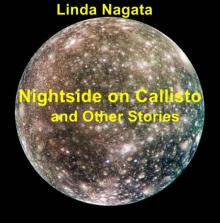 Nightside on Callisto and Other Stories
Nightside on Callisto and Other Stories Pacific Storm
Pacific Storm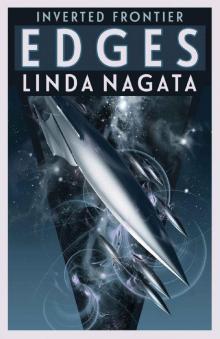 Edges
Edges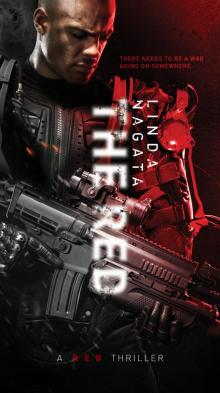 The Red
The Red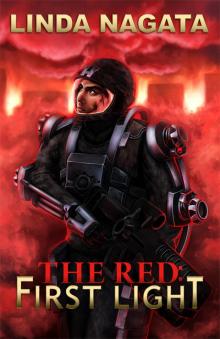 The Red: First Light
The Red: First Light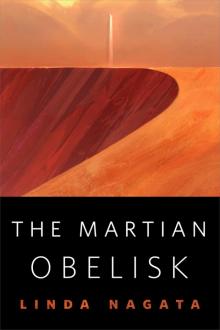 The Martian Obelisk
The Martian Obelisk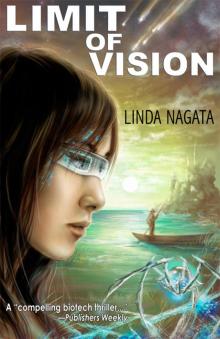 Limit of Vision
Limit of Vision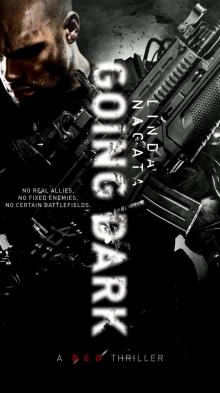 Going Dark
Going Dark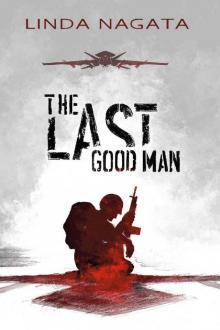 The Last Good Man
The Last Good Man The Trials (The Red Trilogy Book 2)
The Trials (The Red Trilogy Book 2)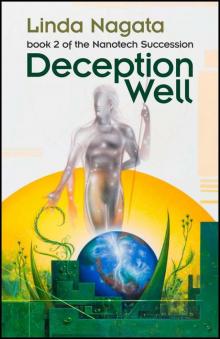 Deception Well (The Nanotech Succession Book 2)
Deception Well (The Nanotech Succession Book 2)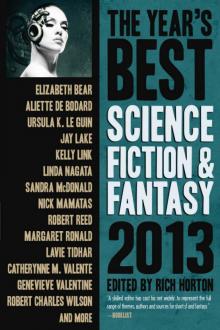 The Year's Best Science Fiction & Fantasy 2013
The Year's Best Science Fiction & Fantasy 2013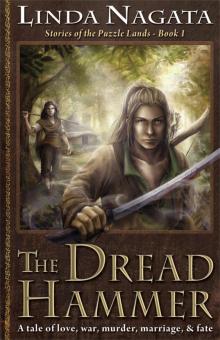 The Dread Hammer
The Dread Hammer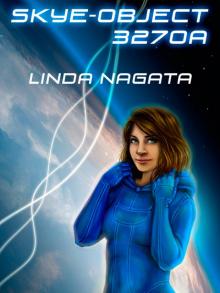 Skye Object 3270a
Skye Object 3270a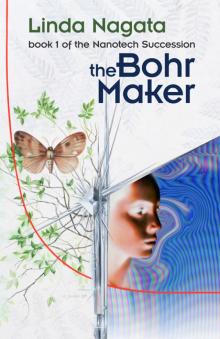 The Bohr Maker
The Bohr Maker